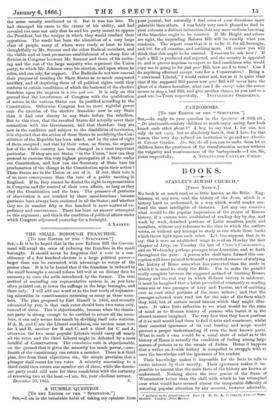THE SMALL BOROUGH FRANCHISE.
[To THE EDITOR OF THE " SPECTATOR."]
SIR,—It is to be hoped that in the new Reform Bill the Govern- ment will avoid the error of reducing the franchise in the small borouihs. It should never be forgotten that a vote in a con- stituency of a few hundred electors is a large political power— larger than can be entrusted with advantage to voters of the poorer class. It is to be feared that if the franchise is reduced in the small boroughs a second reform bill will at no distant date be necessary to cure the evils introduced by the former. The true method of amending our representative system is, as you have often pointed out, to lower the suffrage in the large boroughs, and there only. I will add one word as to the best mode of represent- ing minorities in constituencies returning as many as three mem- bers. The plan proposed by Earl Russell in 1854, and recently advocated by you, is that each voter should have two votes only, instead of three. This is objectionable, because when the domin- ant party is strong enough to be entitled to return all the mem- bers, it can only secure this result by dividthg itself into sections. If A, B, and C are the Liberal candidates, one section must vote for A and B, another for B and C, and a third for C and A, otherwise the two most popular Liberals would carry off nearly all the votes, and the third Liberal might be defeated by a mere handful of Conservatives. The cumulative vote is objectionable, on the ground that it gives the minority too much power,—one- fourth of the constituency can return a member. There is a third plan, free from these objections, viz., the simple provision that a plumper shall count for two votes. A minority amounting to a third could then return one member out of three, while the domin- ant party could still vote for three candidates with the certainty of returning two at the least.—I am, Sir, your obedient servant,




































 Previous page
Previous page